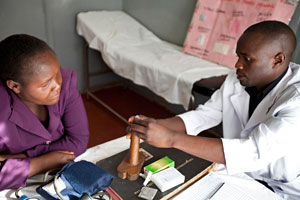Health workforce composition
 Although there is very limited information on numbers, types, and distribution of health workers before and after FP/HIV service integration, the perceived or actual shortage of staff is a commonly stated challenge to integration efforts (Church and Mayhew 2009; Gitau et al. 2011; Hoke et al. 2011; Nielsen-Bobbit et al. 2011; Awadhi et al. 2011; Gilmer and Baughan 2010). Church and Mayhew (2009, 178) highlighted the “importance of staff having excess time before service integration begins if cost effectiveness or improved productivity is to be achieved after new services are added.” A five-country study of FP/HIV integrated services by Family Health International (FHI) found that “up to two-thirds of providers had some ‘non-busy’ time during the day, indicating workloads do not preclude offering additional services” (FHI 2010a, 2).
Although there is very limited information on numbers, types, and distribution of health workers before and after FP/HIV service integration, the perceived or actual shortage of staff is a commonly stated challenge to integration efforts (Church and Mayhew 2009; Gitau et al. 2011; Hoke et al. 2011; Nielsen-Bobbit et al. 2011; Awadhi et al. 2011; Gilmer and Baughan 2010). Church and Mayhew (2009, 178) highlighted the “importance of staff having excess time before service integration begins if cost effectiveness or improved productivity is to be achieved after new services are added.” A five-country study of FP/HIV integrated services by Family Health International (FHI) found that “up to two-thirds of providers had some ‘non-busy’ time during the day, indicating workloads do not preclude offering additional services” (FHI 2010a, 2).
Task shifting (also referred to as task sharing) changes a health worker’s scope of practice and/or assigns responsibility for specific tasks to health workers with shorter training and fewer qualifications, when appropriate. In Kenya, “…nurses now commonly provide ARVs and can insert intrauterine devices (IUDs) and contraceptive implants. Some clinical officers can now perform tubal ligations on women seeking to prevent future pregnancies, something that in the past only physicians performed” (Scholl and Cothran 2011, 11). In Ethiopia, clinic nurses are able to “assess clients living with HIV, including for FP need, and are also allowed to prescribe ARVs and contraceptives to clients based on their needs and clinical eligibility” (ibid., 11). Ethiopia’s Rural Health Extension Program and Urban Health Extension Program practice another type of task shifting that “allows nurses and health extension agents to provide Depo-Provera during home visits,” (ibid., 11) reducing the burden of care at facilities. Although studies have identified negative effects that result from task shifting, such as inadequate compensation, decreased job satisfaction, and lower morale for more specialized health workers, as well as challenges in maintaining service quality standards (WHO 2006), this FP/HIV integration review did not find any discussion of such negative outcomes.
Partly because community health workers (CHWs) are often unpaid and do not undergo long-term training, many countries have placed CHWs at the center of task shifting efforts. CHWs can contribute to increased demand for and uptake of FP/HIV services when accompanied by well-designed training, supervision, and referral mechanisms. In countries such as Malawi, Rwanda, Tanzania, Zimbabwe, Kenya, Ethiopia, and Ghana, CHWs are trained to deliver FP and HIV counseling, provide referrals, and in many cases, provide commodities (Banda and Franco 2011; Nzabonimpa 2011; Banzi et al. 2011; Extending Service Delivery Project 2011; Pathfinder International 2005; Scholl and Cothran 2011; Pathfinder International 2011; Population Council 2001). These efforts often involved adding HIV support services to existing FP workloads, though bidirectional linkages also occurred. Programs in Zimbabwe, Kenya, Malawi, and Ethiopia found that CHW provision of integrated services had contributed to large increases in new FP clients (Extending Service Delivery Project 2011; Pathfinder International 2005; Nyirongo 2011; Scholl and Cothran 2011). The Extending Service Delivery Project (2011) in Zimbabwe also reported that the CHWs’ work contributed to increases in contraceptive use and referrals to voluntary counseling and testing (VCT) centers, as well as changes in attitudes and knowledge about FP and HIV/AIDS.
Where additional human resources are needed, some tasks may also be delegated to newly created cadres of health workers who receive specific, competency-based training (WHO 2008). In Tanzania, Pathfinder International worked with district health management teams and health facility staff to recruit and train a volunteer cadre that initially provided only home-based HIV care and testing services (Banzi et al. 2011). With an increase in the proportion of married women using modern methods of contraception from 2004 to 2010, Pathfinder upgraded the skills of the cadre to include contraceptive and fertility counseling and distribution of pills and condoms. Adding FP services to the cadre’s workload did not result in a loss of quality or in a reduction in the number of clients.

